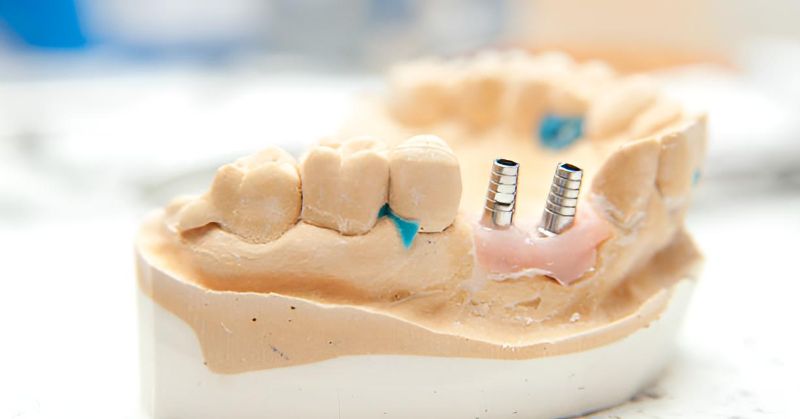What Are the Possible Risk Or Side Effects for Dental Implants?
Dental implants provide an excellent way to replace missing teeth and restore your smile. But as with any medical procedure, there are possible risks and side effects to consider before undergoing implant surgery. In this article, we aim to provide a comprehensive overview of dental implants - what they are, who is a suitable candidate, and most importantly, the potential risks and complications that can arise. By understanding both the benefits and possible downsides of implants, you can make a fully informed decision about whether they are the right choice for your individual needs and health profile.How Can I Get Government Grants for Dental Implants?
updated on February 26, 2024
Dental implants are a sought-after solution for missing teeth, offering a long-term fix that can significantly improve quality of life. However, the cost of dental implants can be prohibitive for many. Understanding government programs and other grants available for dental care, particularly dental implants, can help bridge this financial gap. In this guide, we will walk you through some government assistance and grant programs aimed at making dental implants more accessible.
Medicaid
Medicaid is a joint federal-state program that provides health coverage to eligible low-income adults, children, pregnant women, elderly adults, and people with disabilities. While dental coverage under Medicaid varies by state, it generally includes essential dental services such as cleanings, fillings, and extractions. However, coverage for dental implants is often limited or not included in Medicaid plans. It is important to check with your state's Medicaid program to determine the specific coverage for dental implants.How It Works: Medicaid coverage, including for dental services, is administered by individual states within federal guidelines. This means that while all states provide some level of dental coverage for children, dental benefits for adults are optional and vary by state
Who Is Eligible: Eligibility for Medicaid is generally determined based on income, family size, and some other criteria which can vary by state. It primarily serves low-income individuals and families.
How to Apply: Applicants can apply for Medicaid through their state Medicaid agency, often online, in person, or by phone. It's important to provide all required documentation to prove eligibility.
Medicare
Medicare is a federal health insurance program for people who are 65 or older, certain younger people with disabilities, and people with End-Stage Renal Disease. It primarily covers hospital care (Part A) and medical services (Part B), but generally does not cover routine dental care, including dental implants.How It Works: Medicare coverage is divided into parts: Part A (Hospital Insurance), Part B (Medical Insurance), Part D (prescription drug coverage), and Medicare Advantage Plans (Part C) may offer additional benefits. Dental coverage is limited and usually associated with medical procedures.
Who Is Eligible: Individuals 65 years of age or older, younger individuals with disabilities, and people with End-Stage Renal Disease or ALS are eligible for Medicare.
How to Apply: Enrollment in Medicare can be done online through the Social Security Administration website, over the phone, or in person at a Social Security office.
Children's Health Insurance Program (CHIP)
The Children's Health Insurance Program (CHIP) provides low-cost health coverage to children in families that earn too much income to qualify for Medicaid but cannot afford private insurance. Dental coverage under CHIP varies by state, but it generally includes preventive and basic dental services. Similar to Medicaid, coverage for dental implants may be limited or not included. It is important to check with your state's CHIP program for specific coverage details.How It Works: CHIP provides comprehensive health coverage to children, including routine check-ups, immunizations, doctor visits, and dental and vision care. Dental coverage under CHIP includes preventive services, but the extent of coverage for services like dental implants can vary by state.
Who Is Eligible: CHIP eligibility is based on the family's income, the age of the child, and the rules in their state. It is targeted at children up to age 19 whose families have incomes too high for Medicaid eligibility but too low to afford private coverage.
How to Apply: Families can apply for CHIP through their state's health insurance marketplace, by phone, or by filling out a paper application. Some states also allow online applications through the state Medicaid website.
Cosmetic Dentistry Grants Program (CDG)
While government programs like Medicaid, Medicare, and CHIP may not provide comprehensive coverage for dental implants, there are other avenues to explore. One such avenue is the Cosmetic Dentistry Grants Program (CDG). The Cosmetic Dentistry Grants Program (CDG) is a grant program that provides financial assistance for individuals seeking elective cosmetic dental procedures, including dental implants. Here are some key details about the CDG program:
Who Is Eligible: To be eligible for the CDG program, individuals must meet certain criteria. This includes being over the age of 18, having a genuine need for cosmetic dental treatment, and having a stable oral health condition. The program is open to individuals from all income levels, making it accessible to a wide range of people.
How to Apply: The application process for the CDG program is straightforward. Individuals can apply online through the CDG website. The application is free of cost, and oral assessments and consultations are also provided free of charge (x-ray fees may apply). It is important to note that the CDG program only allows one application per person, and the awarded funds must be used within three months of approval.
Grant Funds and Coverage: The grant funds provided by the CDG program do not need to be repaid. However, it is important to understand that the funds can only be applied toward elective cosmetic procedures, such as dental implants. General dentistry procedures like fillings or cleanings are not covered by the CDG grant funds.

free&low-cost dental clinics
View Now
dental health

Dental Implants

Dental Implants
How to Get Your All-On-4 Dental Implants Without Breaking the Bank
In the United States, the cost of All-On-4 dental implants can vary significantly depending on your location. For instance, the cost in different states ranges from around $12,000 to $39,200 per arch. When seeking affordable options domestically, it's important to explore various clinics and compare their pricing. Additionally, some dental practices might offer flexible payment plans or dental loans to help manage the costs.
Dental Implants
How Painful is Dental Implant Surgery?
If you are missing teeth due to decay, injury, or gum disease, dental implants offer an effective and natural-looking replacement option. Unlike removable dentures that can slip, implants fuse securely into your jawbone for permanent stability. They also help preserve bone and support surrounding teeth better than bridges or dentures. But most patients wonder - how painful are implants? The procedure does involve surgery and recovery time.
Dental Implants
Does Medicare Cover Dental Implants in 2024?
Medicare is an essential service for seniors, covering critical aspects of healthcare such as hospital stays, hospice care, and doctor services. However, when it comes to dental implants, a procedure known for its high costs, many beneficiaries find themselves questioning their coverage options. If you're contemplating this procedure, it's vital to know whether your plan offers coverage. This article aims to shed light on the coverage of dental implants under Medicare, focusing on Medicare Advantage plans.
Dental Implants
How Can I Get Government Grants for Dental Implants?
Dental implants are a sought-after solution for missing teeth, offering a long-term fix that can significantly improve quality of life. However, the cost of dental implants can be prohibitive for many. Understanding government programs and other grants available for dental care, particularly dental implants, can help bridge this financial gap. In this guide, we will walk you through some government assistance and grant programs aimed at making dental implants more accessible.
Dental Implants
Why Are Implants So Expensive?
According to recent statistics, tooth loss is a prevalent issue, especially among older individuals. Adults between the ages of 20 to 64 have an average of 25.5 remaining teeth. However, factors such as age, smoking, lower income, and education level can contribute to a higher likelihood of tooth loss. In this article, we will explore dental implants in detail through the following aspects:







